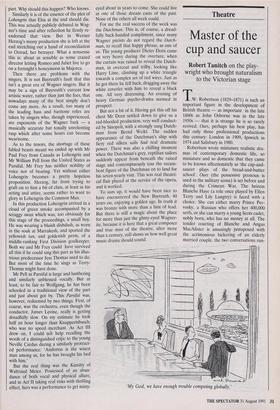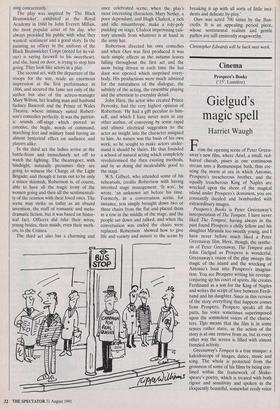Theatre
Master of the cup and saucer
Robert Tanitch on the play- wright who brought naturalism to the Victorian stage
TW. Robertson (1829-1871) is such an important figure in the development of British theatre — as important in the late 1860s as John Osborne was in the late 1950s — that it is strange he is so rarely revived. Ours, perhaps his best play, has had only three professional productions this century: London in 1909, Ipswich in 1974 and Salisbury in 1980.
Robertson wrote miniature realistic dra- mas of contemporary domestic life, so miniature and so domestic that they came to be known affectionately as 'the cup-and- saucer plays of the bread-and-butter school'. Ours (the possessive pronoun is used in the military sense) is set before and during the Crimean War. The heiress Blanche Haye (a role once played by Ellen Terry and Lily Langtry) is faced with a choice. She can either marry Prince Per- vosky, a Russian who offers her 400,000 serfs, or she can marry a young Scots cadet, nobly born, who has no money at all. The tender courting of Blanche and Angus MacAlister is amusingly juxtaposed with the acrimonious bickering of an elderly married couple, the two conversations run- `My God, we have enough trouble competing globally.' ning concurrently.
The play was inspired by 'The Black Brunswicker', exhibited at the Royal Academy in 1860 by John Everett Millais, the most popular artist of his day, who always provided his public with what they wanted: sentiment and a good story. In the painting an officer in the uniform of the Black Brunswicker Corps (noted for its val- our) is saying farewell to his sweetheart, and she, hand on door, is trying to stop him going. They look like actors in a play.
The second act, with the departure of the troops for the war, made an enormous impression at the first performance in 1866, and secured the fame not only of the author but also of the actress-manager Mary Wilton, her leading man and husband Sydney Bancroft and the Prince of Wales Theatre, whose intimacy suited Robert- son's comedies perfectly. It was the patriot- ic sounds off-stage which proved so emotive, the bugle, words of command, marching feet and military band having an almost hysterical effect on audience and players alike.
In the third act the ladies arrive at the battle-front and immediately set off to watch the fighting. The theatregoer, with hindsight, naturally presumes they are going to witness the Charge of the Light Brigade; and though it turns out to be only a minor skirmish, Robertson is, of course, able to have all the tragic irony of the women going and then all the sentimentali- ty of the reunion with their loved ones. The scene may strike us today as an absurd invention, the stuff of romantic and melo- dramatic fiction, but it was based on histor- ical fact. Officers did take their wives, young brides, their maids, even their moth- ers, to the Crimea.
The third act also has a charming and once celebrated scene, when the play's most interesting characters, Mary Netley, a poor dependant, and Hugh Chalcot, a rich and idle misanthrope, make a roly-poly pudding on stage, Chalcot improvising culi- nary utensils from whatever is at hand in the army hut.
Robertson directed his own comedies and when Ours was first produced it was such simple effects as the autumn leaves falling throughout the first act and the snow being driven in each time the but door was opened which surprised every- body. His productions were much admired for the naturalness of the dialogue, the subtlety of the acting, the ensemble playing and the attention to everyday detail.
John Hare, the actor who created Prince Pervosky, had the very highest opinion of Robertson: 'He had a gift peculiar to him- self, and which I have never seen in any other author, of conveying by some rapid and almost electrical suggestion to the actor an insight into the character assigned to him. As nature was the basis of his own work, so he sought to make actors under- stand it should be theirs. He thus founded a school of natural acting which completely revolutionised the then existing methods, and by so doing did incalculable good to the stage.' W.S. Gilbert, who attended some of his rehearsals, credits Robertson with having invented stage management. 'It was', he wrote, 'an unknown art before his time. Formerly, in a conversation scene, for instance, you simply brought down two or three chairs from the flat and placed them in a row in the middle of the stage, and the people sat down and talked, and when the conversation was ended the chairs were replaced. Robertson showed how to give life and variety and nature to the scene by
breaking it up with all sorts of little inci- dents and delicate by-play.'
Ours was acted 700 times by the Ban- crofts. It is an appealing period piece, whose sentimental realism and gentle pathos are still eminently stageworthy.











































 Previous page
Previous page